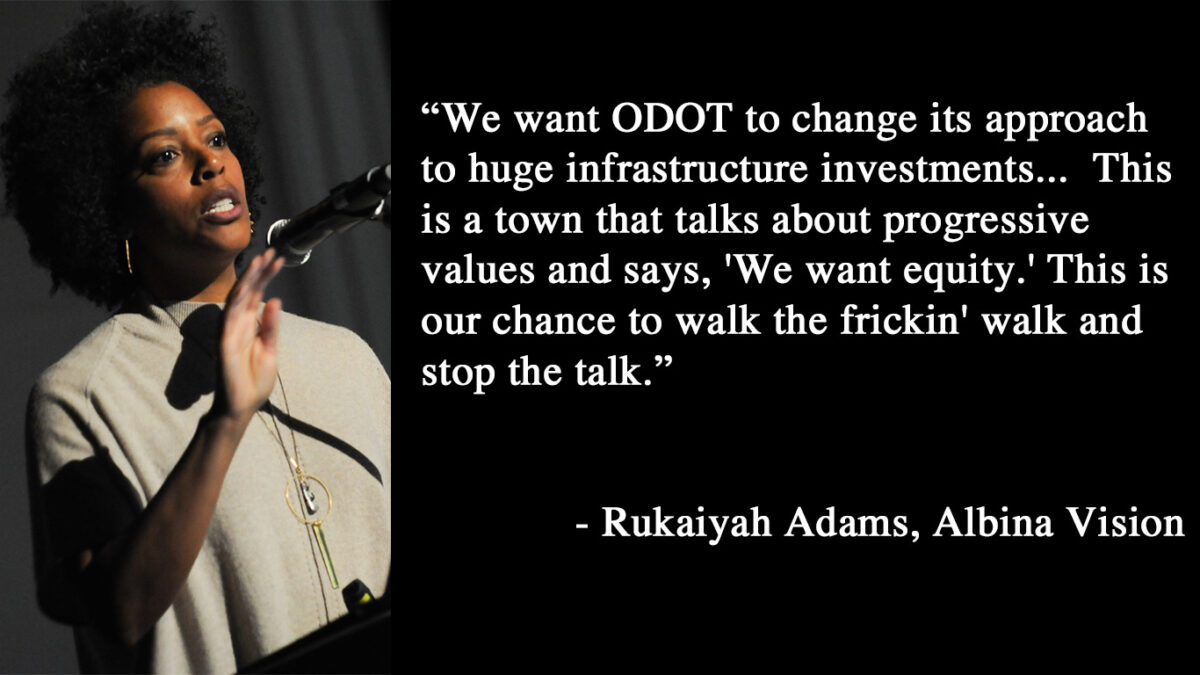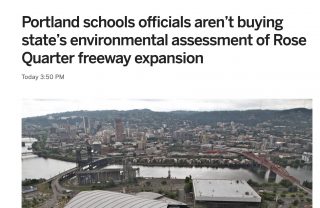Fresh off a public hearing dominated by opposition to their I-5 Rose Quarter project, the Oregon Department of Transportation (ODOT) is now hearing new concerns from the Portland Public Schools Board.
In addition, the leader of the Albina Vision project, Rukaiyah Adams, made public statements about the project at an event hosted by the Portland Parks Foundation last night. And No More Freeways PDX has filed a formal request for an extension to the current comment period for the project’s Environment Assessment on grounds that ODOT withheld crucial data and gave the community only 18 days to analyze it.
Here’s a rundown on each of those fronts…
The big news was reported by The Oregonian late today. According to their story the PPS Board will ask ODOT to do a full Environmental Impact Statement — a much more rigorous undertaking than an Environmental Assessment (both of which are requirements under the federal National Environmental Policy Act (NEPA) process).
The O says, “The district’s concerns mirror those the community at large has expressed about the interstate project,” that ODOT hasn’t given them enough time to evaluate the EA, and that both ODOT and the Portland Bureau of Transportation have failed to fully engage with them about the myriad issues surrounding Harriet Tubman Middle School.
The full PPS Board is due to vote on whether or not they should formally request an EIS at their meeting tonight (6:00 pm, details and agenda here).

(Photo: Jonathan Maus/BikePortland)
ODOT’s I-5 project was also under a microscope at an event last night hosted by the Portland Parks Foundation. There were speakers and a panel to discuss how the project might be an opportunity to create world-class parks and urban spaces. The I-5 Rose Quarter project was paired with Albina Vision (we shared how these projects overlap a few weeks ago). As Chief Investment Officer for Meyer Memorial Trust and a well-respected community leader, Rukaiyah Adams pulls a lot of weight. As leader and chief spokesperson for Albina Vision, she finds herself in an interesting position of influence on the I-5 project.
Adams made several statements last night worth noting (also worth noting is that ODOT Region 1 Director Rian Windsheimer, Commissioner Chloe Eudaly’s Chief of Staff Marshall Runkel, Metro President Lynn Peterson (sitting next to Windsheimer), Multnomah County Commissioner Jessica Vega Pederson, and others were in attendance):
Advertisement
As Adams laid out her group’s plans for restoring the Albina neighborhood that was destroyed by I-5 and other Rose Quarter developments, she said, “We want ODOT to change its approach to huge infrastructure investments like the ones we make with I-5.”
Later in the evening, Adams asked another panelist, a megaproject manager from Washington’s Department of Transportation, about how they were able to make progress on massive infrastructure projects:
“One of the points the Albina Vision team is trying to make is that the evaluation of impact on the community shouldn’t just be the community that’s there today, but the historic community impact. It sounds like you thought of that and you ran an EIS process, which is the more comprehensive evaluation than an EA process. So I wanted to know why you went to an EIS process instead of the faster EA process.”
Then Adams was asked to respond to a question from the audience. Someone asked: “Can you imagine a future for the Albina Vision that is not dependent on widening the freeway?” “Yes. I can envision a future like that,” Adams replied (and the audience began clapping). She then turned to ODOT I-5 Rose Quarter Project Manager Megan Channell and said, “Megan, I’m sorry.”
“Let’s say this project doesn’t come to pass,” Adams continued. “We still have the [freeway] cap question, to stitch the neighborhoods back together. From our point-of-view, the question of, ‘How do you heal this gash that we’ve cut into the city.’… The context is this project, but it’s not limited to the project.”
When asked to consider the future of the Rose Quarter more broadly, given that several major properties have uncertain futures, Adams got real. “Here’s the rub: This is a town that talks about progressive values and says, ‘We want equity.’ This is our chance to walk the frickin’ walk and stop the talk…. We have thousands of people needing affordable housing and this is 94 acres in the central city… I think we should design our processes and outcomes for the people who live here. I want the city to work for the people. And we’re not backing down.”
On that note, No More Freeways PDX has made a formal request for 45 more days to comment on the EA. The coalition leading the charge against the I-5 Rose Quarter project says 632 pages of technical analysis and datasets were only made available on March 13th — nine days after it was requested. “Without these data,” their letter reads, “it is simply impossible to independently assess ODOT’s claims about how this freeway expansion will impact the local community.”
— Jonathan Maus: (503) 706-8804, @jonathan_maus on Twitter and jonathan@bikeportland.org
Never miss a story. Sign-up for the daily BP Headlines email.
BikePortland needs your support.


